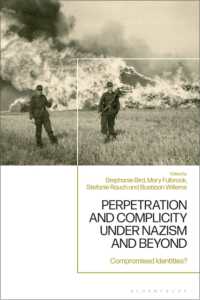- ホーム
- > 洋書
- > 英文書
- > Politics / International Relations
Full Description
Maintaining international security and pursuing American interests is more difficult now than perhaps at any time in history. The security environment that the United States faces is more complex, dynamic, and difficult to predict. At the same time, no domestic consensus exists on the purposes of American power and how best to pursue them. The Center for Strategic and International Studies (CSIS) will look ahead in this annual volume at the "flashpoints" that will likely arise in 2015, how best to deal with them, and what lasting effects they might leave for the next American administration and its allies around the world.
Contributions by: Jon B. Alterman, Samuel J. Brannen, Ernest Z. Bower, Heather A. Conley, Anthony H. Cordesman, Victor Cha, Edward C. Chow, Jennifer G. Cooke, Zack Cooper, Michael J. Green, Matthew P. Goodman, John J. Hamre, Kathleen H. Hicks, Christopher K. Johnson, Stephanie Sanok Kostro, Andrew C. Kuchins, Sarah Ladislaw, Maren Leed, James A. Lewis, Haim Malka, Jeffrey Mankoff, Carl Meacham, Sarah Mendelson, Andrew A. Michta, Scott Miller, J. Stephen Morrison, Clark A. Murdock, Richard M. Rossow, Daniel F. Runde, Thomas M. Sanderson, Conor M. Savoy, Sharon Squassoni, Amy Studdart, Nicholas Szechenyi, and Juan C. Zarate.
Contents
Introduction: Is America in Retreat?, John J. Hamre
Part I: What Role Will Deterrence Play in America's National Security Strategy?
1. The Case for Deterrence, Kathleen H. Hicks
2. Rebuilding Credibility: Regional Perspectives: A Conversation with Jon B. Alterman, Heather A. Conley, and Michael J. Green moderated by Stephanie Sanok Kostro
3. Why Deterrence Failed to Prevent Syrian Use of WMD, Sharon Squassoni
4. A Nuclear Deterrent for the 21st Century, Clark a. Murdock
5. Deterrence in the Cyber Age, James A. Lewis
6. The Role of Conventional Forces in Deterrence, Maren Leed
7. The Challenge of Deterring ISIS, Thomas M. Sanderson
Part II: What Are the Implications of Putin's New Russia?
8. Russia's Influence on Europe, Heather A. Conley
9. Putin's Dilemma, Andrew C. Kuchins
10. The Calculations of Russia's Neighbors, Jeffrey Mankoff
11.Ukraine's Transition, Sarah Mendelson
12. A Test of Wills on Sanctions, Juan c. Zarate
13. Energy Codependency, Edward C. Chow
14. NATO's Eastern Front, Andrew A. Michta
Part III: How Can the United States Best Exert Influence in Today's Middle East?
15. Acting and Reacting in the Middle East, Jon B. Alterman
16. The Need for Better Civil-Military Planning, Anthony H. Cordesman
17. The Challenge of Non-state Actors, Haim Malka
18. Counterterrorism Success and Failings, Samuel J. Brannen
Part IV: Is the Rebalance of Asia Sustainable?
19. Asian Perceptions of the Rebalance, Michael J. Green and Zack Cooper
20. Keeping Focus on Korea, Victor Cha
21. Economic Imperative in Southeast Asia, Ernest Z. Bower
22. The Long View on India, Richard M. Rossow
23. Maintaining the U.S.-Japan Alliance, Nicholas Szechenyi
24. Recalibrating on China, Christopher K. Johnson
Part V: Is a Competing Economic Order Emerging?
25. The Evolving Institutional Landscape, Matthew P. Goodman
26. Strengthening the Existing Order, Amy Studdart
27. The Evolution of the Global Trading System, Scott Miller
28. Geopolitical Instability and Energy Markets, Sarah Ladislaw
29. Divergent Perspectives of the Democratic BRICS: A Conversation with Carl Meacham, Jennifer G. Cooke, and Richard M. Rossow moderated by Amy Studdart
Part VI: Will Ebola Evolve from a Health Crisis to an Economic and Governance Crisis?
30. The Trajectory of Ebola and our Response, J. Stephen Morrison
31. The Economic Impact of the Ebola Outbreak,Daniel F. Runde and Conor M. Savoy







